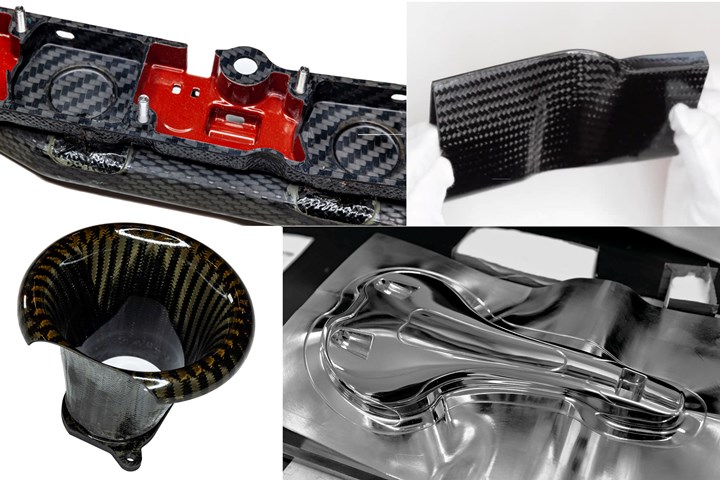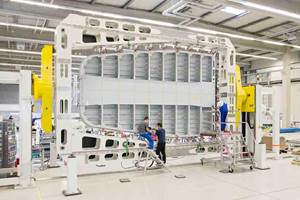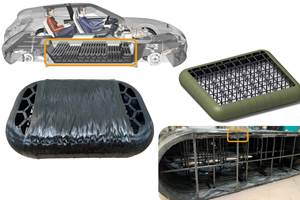CDZ Compositi introduces patented 3D Flex Composite
Specialist in structural and aesthetic prepreg press parts enhances 3D shaping and flexibility in composite parts using carbon and other reinforcement fibers.
CDZ Compositi (Veneto, Italy), founded in 1986, has become an expert in design and manufacturing of carbon fiber-reinforced polymer (CFRP) components for motorsports and sporting goods applications. The company uses its know-how in hot compression molding to manufacture complex parts — including with undercuts — directly in presses with no need for an autoclave.
Specializing in the development and production of structural and aesthetic composite parts, CDZ has now patented its 3D Flex Composite technology to enable components that are easily formable but also may contain areas that are soft, flexible and highly resistant to repeated loads and wear.
Developing composites expertise
Since 1990, CDZ has focused its attention on the growing market for high-quality components with relatively small dimensions made using carbon fiber for a wide variety of applications, mainly in the automotive, motorsport and sporting goods markets.
With the introduction of its press molding technology, CDZ Compositi has developed an advanced process that reportedly enables it to achieve significant production volumes, while maintaining an excellent quality/price ratio. Today, the company works mainly with epoxy matrix prepregs using molds and equipment designed in-house and made with CNC machines.
With a large fleet of presses and two autoclaves, CDZ Compositi says it is able to guarantee a high production capacity and a competitive market price. All products are processed and finished in its factory, and its technical department is able to provide qualified consultancy and support for the development of new projects.
Experience and continuous technological innovation have allowed CDZ Compositi to reach a high level of design and production expertise, which is used to meet demanding customer expectations.
3D Flex Composite technology
CDZ has developed and patented a new technology with which it has realized ambitious projects. It derives from a need seen in the market, according to the company. Composite materials are well known for their light weight and ability to provide high stiffness and strength. What CDZ Compositi has sought to achieve is to give these materials the ability to flex and “move.”
For two years, CDZ has been worked to develop a resin formula and process in order to achieve this result. The innovation lies in the flexibility and shape memory now inherent in the composite material, which can be reinforced with carbon fiber or other types of reinforcement, including aramid and other synthetic fibers, even natural fibers.
Despite its excellent flexibility, parts made with 3D Flex Composite technology maintain the high mechanical characteristics that distinguish carbon fiber or, alternatively, they retain the excellent cutting and abrasion resistance when using aramid fiber.
The polymerized resin matrix also exhibits a high thermal resistance similar to conventional rigid epoxy resin. The 3D Flex Composite material can be molded with a variable thickness and with a 3D shape. The stiffness of the resulting component can be customized generally, addressing a variety of aspects and in-service requirements.
Benefits of this technology include:
- Composite parts 3D-shaped in one step on the mold (no post-forming)
- Shape memory and good flexural resistance.
- Chemical compatibility with other polymers for bonding, co-molding, overmolding and graphic printing.
- High performance from thermosetting resin matrix, including thermal resistance.
- High abrasion and perforation resistance.
- No air bubbles and uniform fiber saturation.
Having demonstrated its capabilities, CDZ Compositi now seeks partners to co-develop new projects and products based on this technology for production of high-performance composite parts.
Related Content
From the CW Archives: Airbus A400M cargo door
The inaugural CW From the Archives revisits Sara Black’s 2007 story on out-of-autoclave infusion used to fabricate the massive composite upper cargo door for the Airbus A400M military airlifter.
Read MorePlant tour: Airbus, Illescas, Spain
Airbus’ Illescas facility, featuring highly automated composites processes for the A350 lower wing cover and one-piece Section 19 fuselage barrels, works toward production ramp-ups and next-generation aircraft.
Read MoreTU Munich develops cuboidal conformable tanks using carbon fiber composites for increased hydrogen storage
Flat tank enabling standard platform for BEV and FCEV uses thermoplastic and thermoset composites, overwrapped skeleton design in pursuit of 25% more H2 storage.
Read MoreNanopoxy, Nione jointly develop nanostructured epoxy resin
Epoxies featuring nanometric niobium pentoxide particles promote toughness, UV radiation resistance and other performance gains.
Read MoreRead Next
VIDEO: High-volume processing for fiberglass components
Cannon Ergos, a company specializing in high-ton presses and equipment for composites fabrication and plastics processing, displayed automotive and industrial components at CAMX 2024.
Read More“Structured air” TPS safeguards composite structures
Powered by an 85% air/15% pure polyimide aerogel, Blueshift’s novel material system protects structures during transient thermal events from -200°C to beyond 2400°C for rockets, battery boxes and more.
Read MorePlant tour: Daher Shap’in TechCenter and composites production plant, Saint-Aignan-de-Grandlieu, France
Co-located R&D and production advance OOA thermosets, thermoplastics, welding, recycling and digital technologies for faster processing and certification of lighter, more sustainable composites.
Read More













.jpg;maxWidth=300;quality=90)













